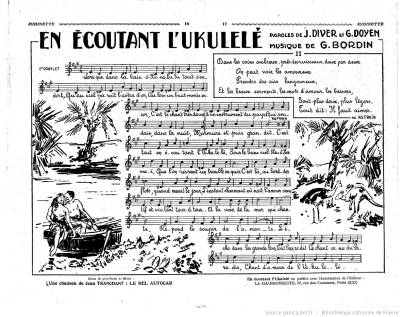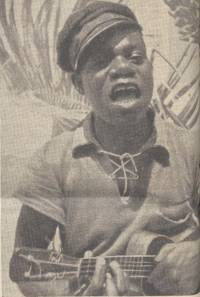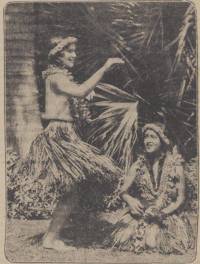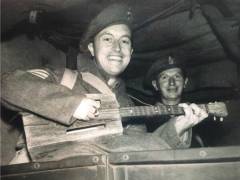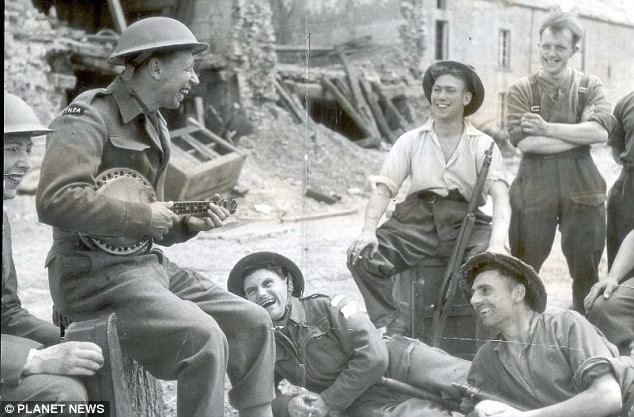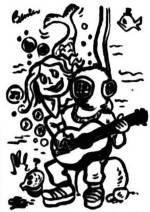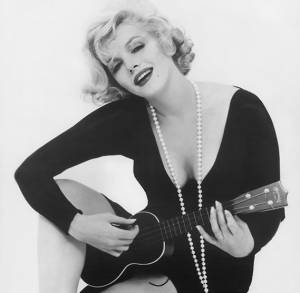
Sources of the History of the Ukulele: 1930-1979
The Second 50 Years
1930
Too Many Ukes
Like the man who disliked Scotland because he met too many Scotchmen, Cliff Edwards („Ukulele Ike“) doesn't like Honolulu, home of the uke. He went there recently and returned disgusted. „Everyone's stealing my stuff now,“ he wailed. „Even Honolulu is swarming with people who play ukes and sing. Rank plagiarism, I call it.“
Evening News (Sidney)  10.3.1930, S. 13
10.3.1930, S. 13
'Ukulele Souls' of Pleasure-Mad World
Free Church Minister's Call To Battle
„A pleasure-mad world is producing Ukulele souls,“ declared the Reverend Herebert Legatte of Manchester, at the National Council of Evangelical Free Churches at Nottingham recently, when he urged that the Churches should sound a call to youth. (…)
„The modern world treats them harshly. Cinemas and wireless make it easy for them to live dangerously or romantically by proxy.
„A pleasure-mad world besieges them with new escapes from boredom. Do you wonder that many of them have ukulele souls? But multitudes of them are too fine to try to drown the sound of the world's anguish with jazzy music. They want to help.
The Singapore Free Press and Mercantile Advertiser  29.4.1930, S. 2
29.4.1930, S. 2
Dag van Onzekerheid te Baldonnel
Verteldt wordt, dat baron von Hünefeld een ukulele heft nagelaten, welke Kingsford Smith als souvenir wist machtig te worden. Hij zou nu het voornemen kousteren, die ukulele als mascotte mee te voeren.1)
De Telegraaf  13.06.1930
13.06.1930
1931
Exotisme
Pour bien parler de cette sorte de chose qui n'est ni un lieu ni un sentiment et que l'on nomme exotisme, il faut n'avoir jamais mis les pieds ni en Afrique ni en Asie ni en Océanie. Il faut avoir gardé des Edens et des Eldorados une vision non déformée par les faits. Les voyages tuent l'exotisme. (…) [131]
Sachons donc «voir» les îles du Pacifique et toutes les îles lointaines, sans ombres blanches. Ecoutons les guitares hawaïennes dans le phonographe, écoutons l'ukelele dans la T.S.F.2) Goûtons les cuisines exotiques dans les restaurants exotiques de Paris, et cela nous fera échapper au bifteck aux pommes et au corned-beef des lointains palaces et des bateaux de touristes. (…)
Regardons les paysages des îles dans les films où pour nous on les a choisis, regardons les derniers Maoris quand des metteurs en scène intelligents les ont, pour nous, déshabillés en véritables primitifs.
Ainsi notre imagination s'emplira de belles images, de belles images que n'obscurcira aucune fumée de charbon. Nous aurons en nous un beau monde lointain, peuplé de chants, peuplé de danses, peuplé de longs palmiers souples et de jeunes femmes souriantes. Ainsi nous pourrons véritablement nous adonner à l'exotisme, au dernier exotisme qui soit laissé à l'homme. [133]
Fernand Divoire in: L'Esprit français: hebdomadaire littéraire et artistique  10.1.1931, S. 131-133
10.1.1931, S. 131-133
Hold-Up in Shop
Ex-Follies Girl as Gang Chief
Marion Roberts, the former show-girl sweetheart of Jack Diamond, New York's notorious gangster, has herself become the leader of a gang of gunmen who are operating throughout the New England States, according to the police.
She has been identified as the leader of a gang which held up two assistants at a chemist's shop at Middleton, Connecticut, last night, and escaped with all the money in the cash register as well as a banjo and a ukulele.
The former Ziegfeld follies3) girl is known to have been fond of the banjo and ukulele, which she played professionally.
The Singapore Free Press and Mercantile Advertiser  30.6.1931, S. 6
30.6.1931, S. 6
L'Élément musicale exotique à l'exposition coloniale
D'ailleurs, les jeunes Hawaïens n'ont plus à leur disposition, de nos jours, que la guitare qui se popularise de plus en plus et l'ukelele qui a remplacé un certain nombre d'instruments à cordes, à vent et à percussion qui ne trouveraient plus d'exécutants capables d'en tirer parti.
Le ménestrel: journal de musique  20.11.1931, S. 1
20.11.1931, S. 1
Ukulele! Is It a Musical Instrument? Union to Rule on May Singhi Breen
Sharp dissension today had arisen in the ranks of the Musicians' Union over the status of a ukulele and a ukulele player.
Is a ukulele a musical instrument and is a ukulele player a musician?
The question comes to vote at a meeting today, but meantime the cause of the argument, May Singhi Breen, the popular radio singer and strummer, is brought up because some members of the union demand that she be excluded.
Miss Breen plays nothing but the ukulele and malcontents hold that she is simply a ukulele player — not a musician.
Deems Taylor, the composer, was quick to defend the ukulele, however, when he heard of the controversy.
„I don't see,“ he said, „why a good ukulele player, such as Miss Breen, shouldn't be admitted to the Union. Triangle players, snare drummers and expert sand block rubbers carry union cards.“
Walter Damrosch and Dr. Henry Hadley, noted orchestra directors, are inclined to class the ukulele as a piece of wood rather than a musical instrument.
The Pittsburgh Press  8.12.1931
8.12.1931
1932
Lady Chaytor Leaves For Australia
Ukulele and robot pilot
The Evening News (Rockhampton)  , 7.3.1932, S. 9
, 7.3.1932, S. 9
Lady Chaytor
L'aviatrice anglaise joue de son “ukeleelee“ avant son envoi vers l'Australie.
A "Fashion" Flight
Although she has no Intention of breaking records in speed and endurance, Lady Chaytor, if her plans mature, will certainly be the first to make a „fashion“ flight to Australia. Lady Chaytor is the wife of Sir Edmund Chaytor, baronet, of Witton Castle, Durham, and is a recognised expert in women's modes, concerning which it is her ambition to lecture in the Commonwealth. Her idea is to fly to Australia, and, once arrived, to make flights to every centre in which she proposes to speak, notably, of course, to the various State capitals. Not yet having gained her flying licence, she will take Mr. R. T. Richards, a young engineer, as pilot, and will herself act as navigator. Her machine will be a Gipsy Moth.
Lady Chaytor is quite frank in declaring that her primary object ls to make money, sufficient, if possible, to enable the family to resume residence in Witton Castle, parts of which dato from the eleventh century. „This,“ she says, „will be no attempt on my part to break any record. I want to make some money by lecturing on fashions and clothes, and it seemed to me that it would be more exciting for a lecturer to arrive by air.“ All she will take with her on this adventurous flight will be all that she can take with her – a dress of specially uncrushable material, which will be rolled up in a box on which she will sit, and a miniature ukulele that will, no doubt, help to pass the time if the plane happens to be forced down in a lonely spot.
The Sydney Morning Herald  19.3.1932, S. 18
19.3.1932, S. 18
Lady Chaytor And Soldiers
Sings Old Songs to Ukulele
There was nothing conventional about the entertainment which Lady Chaytor gave to most of the patients in the Caulfield Military Hospital yesterday … As soon as she entered each ward she made her way to the piano, lightly perched herself on the top, and at once discarded her hat. Then, with an amazing vitality, she sang song after song, accompanying herself on a ukulele. The patients sang most of the familiar songs with her.
Flier and Expert in Fashion
Lady Chaytor Coming Here
Works for Charity
Lady Chaytor, slight, with golden-bronze hair, a twinkling smile, and a vivacious voice, is just the type to whom adventure would appeal, and her chequered flight from England with Mr. R. T. Richards, practically a novice pilot, gave her plenty of it. She began taking lessons in flying at the end of last year and, although she could handle an aeroplane reasonably well, she did not have a pilot's certificate. …
Lady Chaytor came to Australia to tell us about individuality in fashions, rather than the modes of the moment, but she brought no extravagant wardrobe with her. The limits of the plane cockpit prohibited that.
… „Here's my luggage,“ she laughed, as she threw to her pilot a small box with a leather cushion attached. The pyjama suit and a ukulele specially made for the plane completed her luggage. „I just had to have a little music on the way,“ she explained.
The Advertiser (Adelaide)  19.7.1932, S. 8
19.7.1932, S. 8
Lady Chaytor Due This Week
To Lecture On Fashions
Lady Chaytor, who combines dangerous cross-continent flights with light-hearted strums on her ukulele and a flair for distinctive fashion lectures, will arrive in Adelaide this week, after popular seasons in Sydney and Melbourne.
The Advertiser (Adelaide)  2.8.1932, S. 8
2.8.1932, S. 8
1933
Amerikaansche auteursrechten op radio enz.
De radio galmt den helen dag door en het jonge geslacht stelt zich tevreden met een guitar of een ukulele, hoogstens een saxophoon, om in een jazzband te kunnen meespelen. Hetgeen er allemal op wijst, dat de uitvoering van muziek in de handen van een betrekkelijk klein aantal menschen en machines is geraakt, die de auteursrechten moeten opbrengen. Terwijl de populariteit van een massa muziek dus kolossaal toenaam, ging het inkomen van componist en uitgever naar verhouding achteruit.
Les femmes hawaïennes
Elles portent, pour tout vêtement, ces jupes de paille colorée qui dansent, elles-mêmes, autours de leurs hanches de fillettes et s'ouvrent, au rythme de l'ukulele, sur les colonnes brunes de leurs jambes.
Ce sont de jeunes garçons qui, accroupis dans le fond de la scène, jouent de cet ukulele dont nos disques ont recueilli la chanson, dont les harmonies ont rempli nos dancings européens.
Christiane Fournier, in: La femme de France  1.8.1933, S. 14
1.8.1933, S. 14
Was sind die neuen in Mode gekommenen Musikinstrumente?
Auch die Ukulele5) ist erst seit zwei Jahren aufgetaucht,6) doch ist sie bereits bei modernen Frauen7) in Mode gekommen. Üblicherweise wird sie zur Begleitung von Chören benutzt, doch paßt sie auch gut dazu, abends allein zu singen. Ursprünglich ist sie ein Instrument der Ureinwohner von Hawaii, das ziemlich einfach ist und das man mit der Hand spielt. Die Form ist rund oder oval. In Hawaii hergestellte Instrumente kosten, wenn sie nicht ganz billig sind, mindestens 13 Yen 50 Sen, und selbst in Japan hergestellte mindestens 3 Yen 50 Sen. Am Anfang sollte man mit einem billigen Instrument beginnen. Es ist aber leicht, Fortschritte zu machen. Es gibt auch einfache Anleitungen.
(Leseranfrage )
Leser: Auf Seite 6 der Morgenausgabe Ihrer Zeitung vom 17.9. haben Sie ein Ukulele8) genanntes Musikinstrument vorgestellt. Gibt es Musikalienhändler, die es verkaufen? — Chang Ŭnpa, Geschäftsführer eines Musikhauses in Käsŏng.
Redaktion: Bitte wenden Sie sich an das Musikhaus Seyama in Keijō-Honmachi 1-Chōme9) oder das Musikhaus Kotoyoshi in Chongno 2-Chōme.10)
| Das Musikhaus Seyama in Seoul (Keijō), ca. 1940 |
|---|
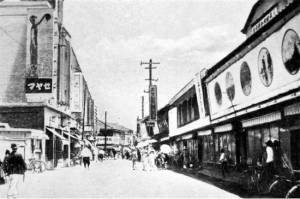 |
| Das Musikhaus Seyama liegt auf der linken Straßenseite, direkt gegenüber dem Naniwa-Schauspielhaus (ab 1935 Kino, von 1950 bis 1974 als Myŏngdong-Theater bekannt). Quelle: Wikipedia, Original-Link. |
1934-1947
| Martin Ukulele | |
|---|---|
 | Länge 529 mm, Mensur 347 mm. Die Martin-Ukulelen galten in dieser Zeit als die führenden Instrumente. |
| The University of South Dakota, National Music Museum | |
1935
Ukulele Music Born in Germany
Hawaiians Wrongly Blamed
Speaking last night at a special welcome home reception arranged in his honour by the Melbourne Music Club, Mr Frits Hart deplored the passing of the traditional Hawaiian chant. „Although the Islanders sing very charmingly, the so-called Hawaiian music associated with ukuleles and steel guitars originates mainly from Germany or Italy, and is harmonised in the worst possible taste by Americans. By contrast with this hybrid form of entertainment, the ancient chants — of which at one time there existed several thousand — reveal a strong, rhythmic, barbaric art reminiscent of the method of intoning employed by the priests in their religious ceremonies.“ Mr. Hart described the curious composition of the orchestra which performed under his direction in Honolulu. Comprising nearly 70 players and 10 nationalities, this organisation presented the conductor with a difficult language problem, but the standard of performance was high, and each concert was preceded by seven rehearsals.
The Argus  28.5.1935, S. 8
28.5.1935, S. 8
1936
Die Olympischen Spiele
De Engelsche troepen
Abschied von Waikiki
… Im hawaischen Hulatanz ist der Oberkörper völlig in Ruhe. Füßen, Hüften und Händen fällt die Aufgabe zu, das auszudrücken, was der Tanz sagen will. Braune Sänger und Sängerinnen begleiteten den Tanz mit Gesang zur Stahlgitarre, der Ukulele13) — einzelne sangen den Text, die anderen fielen im Chor ein.
Paul L. Dengler: „Abschied von Waikiki“. In: Neue Freie Presse  Nr. 25872, 20.9.1936, S. 27
Nr. 25872, 20.9.1936, S. 27
1937
Jazzmuziek, de grimas van onze eeuw
De Jazz kwam uit Amerika … Men houdt de jazz voor negermuziek, wat een van de redenen was, waarom ze in Duitschland verboden werd. Jazz is echter volstrekt geen negermuziek. (…)
In de Jazzbands doken exotische instrumenten op, zooals bijv. de negerbanjo en de ukulele, die de Amerikaansche geld-aristocraten (of pseudo-aristocraten), die het muziek-gedoedel al lang aartsvervelend vonden en med een geblaseerd gezicht alleen nog maar aan hun cocktails slurpten, zonder nog naar de muziek te luisteren, plotseling deden opschrikken: een nieuwe lente, een nieuw geluid. Ja, daar was het nu juist om te doen. Differentiatie. Een nieuwe prikkel.
De Sumatra post  30.01.1937
30.01.1937
En écoutant l'Ukulélé
Midinette. Journal illustré  2.4.1937, S. 16–17
2.4.1937, S. 16–17
1938
Theodor W. Adorno: Über den Fetischscharakter in der Musik
Die regredierten Hörer benehmen sich wie Kinder. Sie verlangen immer wieder und mit hartnäckiger Tücke nach der einen Speise, die man ihnen einmal vorgesetzt hat.
Für sie wird eine Art musikalischer Kindersprache präpariert, die sich von der echten dadurch unterscheidet, dass ihr Vokabular ausschliesslich aus Trümmern und Entstellungen der musikalischen Kunstsprache besteht. In den Klavierauszügen der Schlager finden sich sonderbare Diagramme. Sie beziehen sich auf Guitarre, Ukulele und Banjo – ebenso wie die Ziehharmonika der Tangos, verglichen mit dem Klavier, infantile Instrumente – und sind Spielern zugedacht, die nicht die Noten lesen können. Sie stellen graphisch die Griffe auf den Saiten der Zupfinstrumente dar. Der rational aufzufassende Notentext wird durch optische Kommandos ersetzt, gewissermassen durch musikalische Verkehrssignale. Diese Zeichen beschränken sich natürlich auf die drei tonischen Hauptakkorde und schliessen jeden sinnvollen harmonischen Fortgang aus. Ihrer würdig ist der geregelte musikalische Verkehr. Mit dem auf den Strassen kann er nicht verglichen werden. Es wimmelt von Fehlern in Satz und Harmonie. Dabei handelt es sich um Querstände, falsche Terzverdoppelungen, Quinten- und Oktavfortschreitungen und unlogische Stimmführungen aller Art, zumal im Bass. Man möchte sie zunächst den Amateuren zur Last schreiben, von denen meist die Schlageroriginale stammen, während die eigentliche musikalische Arbeit erst von den Arrangeuren geleistet wird. So wenig jedoch die Verleger einen unorthographischen Brief in die Welt gehen liessen, so wenig ist vorstellbar, dass sie, von ihren Sachverständigen wohlberaten, Amateurversionen unkontrolliert publizieren. Die Fehler sind entweder von den Sachverständigen bewusst produziert oder bleiben absichtlich stehen – mit Rücksicht auf die Hörer.
Theodor W. Adorno: „Über den Fetischscharakter in der Musik.“ In: Zeitschrift für Sozialforschung  Jg. 7 (1938), S. 321-356, hier S. 345)
Jg. 7 (1938), S. 321-356, hier S. 345)
Muziek in alle kleur en toon
Contrasten in de muziek. De oude Javaanse gamelanspeler contrasteert met onzen man-van-de-harmonica. Dat is Oost en West. En een type van een geheel andere wereld is de neger-zanger met zijn ukulele.
Die Ananas-Königin und der Prinz Hawai
Die Liebestragödie eines "braunen Gigolo"
(…) Prinz David, wie er kurz genannt wurde,14) war infolgedessen ein interessanter Mann und umschwärmter „Party-Partner“, und es verging kaum ein Abend, an dem er nicht zu einer Ukulele-Party engagiert wurde – hinter der sich in mehr als einem Falle wesentlich andere Dinge verbargen.15) Seine Gattin Arvilla war mit diesen Eskapaden begreiflicherweise wenig einverstanden. (…)
Not Hawaiian, the Ukulele!
The musical instrument commonly called the Hawaiian ukulele is not Hawaiian at all. It was carried there by Portuguese sailors who strummed upon it their native Portuguese melodies. The Portuguese, in turn, got in from Germany, which is believed to be the original home of the instrument, as established by drawings and descriptions dated 1180 A.D. in the Royal Library at Stuttgart. The name ukulele should be pronounced „oo-koo-lay-lay.“ The word is derived from uku and lee16), meaning a jumping flea, and was probably suggested by the rapid movement of the fingers of the player.
The Buckingham Post  9.12.1938, S. 4
9.12.1938, S. 4
Mädchen auf Hawai
Seit meiner frühesten Jugend träumte ich von Hawai. Die „Insel der Seligen“ schien mir das Paradies auf Erden. Oft träumte ich stundenlang und vergaß dabei auf die wichtigsten Dinge. Hawai! Einmal Hawai erleben dürfen und dann sterben. Einmal eine Nacht der Südsee auskosten, den schluchzenden, sehnsüchtigen Klängen der Ukulele lauschen, den betäubenden Duft der märchenhaften Blüten einatmen und nicht schlafen, sonder nur über das weite, nächtliche Meer sehen! Ich träumte von den traumhaft schönen Hawaimädchen, von den Blütenkränzen um ihren Hals, von den Pflanzenfaserröcken, die von ihrer zauberhaften Gestalt fast nichts verbergen. Insel der Seligen!
Walter Hans Boese: „Mädchen auf Hawaii“. In: Neues Wiener Tagblatt  (Tages-Ausgabe) 17.12.1938, S. 3717)
(Tages-Ausgabe) 17.12.1938, S. 3717)
1939
Buster Keaton: Pest from the West (1939)
Das Kapital juristischer und natürlicher Personen und die Kontrollen
In bestimmte Industrien können nicht mehr als 30.000 Yen investiert werden
… Die Ausführungsbestimmungen zum Investitionskontrollgesetz18) werden wie folgt geändert …
17. Investionen von mehr als 30.000 Yen in die nachfolgend genannten Warengüter oder in neue, erweiterte oder verbesserte Anlagen bedürfen der Genehmigung durch das Generalgouvernement …: Kosmetika …, kosmetische Utensilien …, Rauchutensilien …, Schmuckgegenstände …, Pelzwaren …, Lederwaren …, Spielzeuge …, Musikinstrumente: Piano, Orgel, Akkordeon, … Ukulele, Banjo …
Kaili's Royal Hawaiians
Daverend succes bij eerste optreden
Dit gezelschap gaaf tusschen de andere nummers door een beeld van de ontwikkeling van de hula-dans en van de Hawaiï-muziek, die na die uitvinding van de ukulele en van de steel-guitaar door Joe Kekuku in 1906 zoo'n enorme vlucht heeft genomen, dat dit instrument in bijna geen enkele band, die amusementsmuziek ten gehoore brengt, ontbreekt.
De Indische courant  8.8.1939
8.8.1939
1940
Hawaiian Guitaar
en Ukulele, het moderne instrument. Privaat-les vanaf f 2 per maand. Instrument in bruikleen f 3 per maand.
H. Smit, Schiekade 26.
Rotterdamsch nieuwsblad  2.12.1940
2.12.1940
Hinweise zur Freizeitgestaltung in der US-Armee
The playing of small, so-called pocket size instruments,19) as well as guitar, mandolin and ukelele has been found to have considerable appeal as a spare-time activity. It is suggested that instructors for these instruments be found and classes organized. Within a very short time, it will be possible for large numbers of „students“ to play popular songs and swing tunes together, thereby providing diversion and entertainment for themselves and their fellow soldiers.
Regimental Recreation Officer's Guide, United States Army, prepared by the Morale Branch, War Department, Washington, D.C.  , ca. 1940, S. 18
, ca. 1940, S. 18
 |
| Head and shoulders portrait of George Formby playing his ukulele. Taken while he and his wife were entertaining troops in Normandy. © IWM (B 8265) |
1941
De eigenlijke Hawaiïan-muziek woord weinig meer gehoord
De Amerikaansche namaak streelt beter het gehoor
Wij mogen gerust zeggen, dat de Hawaiïan-muziek ook in Indië zeer populair is. Veelen beoefenen dat muziekgenre. Vaak worden Hawaiïan-wedstrijden gehouden.
In nevenstaand artikel zullen wij e.e.a. omtrent den oorsprong der Hawaiïan-muziek vertellen.
De oorsprong van de ukulele
„Ukulele“ is een woord, dat bij ons de voorstelling aan palmen, aan naakte zwarte menschen en aan wilde dansen in het oerwoud doet ontstaan. „Ukulele“ klinkt exotisch en omvat in de Amerikaansche jazz-muziek alles, wat zeldzaam is uit tropische landen, maar slechts weinigen weeten, dat dit woord uit de taal van Hawaii stamt en een muziek-instrument, de Hawaiian-guitar der moderne dansmuziek, beteekent.
Spreekt men van Hawaii, dan denkt men aan palmen-eilanden, aan met bloemen getooide bruine meisjes en an warme, sterrenklare nachten, an zee en an een muziek, waarin al deze poëzie tot uitdrukking komt. Hawaii is thans voor den cultuur-moeden blanke, wat anderhalve eeuw geleden Tahiti, het „nieuwe Kithera“, voor de Franschen was.
Men moet echter niet denken, dat ook de bewoners van het schoone eiland zoo voelen als de blanken. De Hawaiïer praat niet over palmen, zooals de menschen dat in Europa doen. Voor hem is de palm en gewone, nuttige boom en hij kan maar niet begrijpen, waarom de vreemdeling daarover in vervoering kan geraken. (…)
Men zou hier kunnen opmerken, dat de tonen van de Hawaiïan-guitar med haar weenende, vleiende klanken ons aangenaam aandoen. Maar men bedenke, dat diet muziek-instrument volmaakt werd naar het voorbeeld van de Ukulele, een kleine, eenvoudige guitaar, die weliswaar aangenaam, maar niet bepaald betooverend klinkt en eigenlijk niet uit Hawaiï afkomstig is. Dit instrument med den zeldzamen naam werd den Hawaiïers pas door de Portugeesche kolonisten gebracht en is dus niet specifiek Hawaiïaneesch, doch Europeesch. (…)
In de lokalen van Honolulu kunnen de blanken de muziek hooren, die zij hooren willen. Als een oude priester van Pele ooit hooren kon, welke „Hawaiïsche“ muziek zijn landslieden den blanken „pecunia causa“ den blanken voorspelen, dan hat hij ongetwijfeld zijn hoofd geschut over de melodie, de harmonie en over de instrumenten van deze Amerikaansche Schlagermuziek, – en misschien wel het meest over haar teksten.
De Indische courant  8.2.1941
8.2.1941
Hawaii is niet het stamland van de Ukulele
Veelal woordt de ukulele aangezien voor een echt Hawaiians muziekinstrument. De oorzaak daarvan zal wel hierin gezocht moeten worden, dat wij het instrument stets horen noemen in verband med „Hawaiian muziek“, terwijl in taal van bij ons bekende liedjes over Hawaii de ukulele wordt genoemd.
Ondanks dit alles is het onjuist te menen, dat het instrument op Hawaii voor het eerst is ontstaan. Integendeel, op Hawaii is het een import-artikel, want het is er ingevoerd door Portugese immigranten. De Hawaiianen vonden het een mooi instrument en leerden snel het gebruik er van, terwijl zij het ook zijn naam gaven: ukulele, hetgeen betekent „de springende vloo“. Thans is het op Hawaii en in Hawaiiaanse bands over de gehele wereld zo verspreid, dat men het „echt Hawaiiaans“ is gaan aanzien.
Ook de guitar is niet oorspronkelijk van Hawaii afkomstig. …
Het volk: socialistisch dagblad  26.4.1941
26.4.1941
Ondanks all verandering en modernisering is Hawaii het land gebleven van muziek en dans. Bij de klanken van de ukulele wordt de inheemse dans, de Hula, uitgevoerd.
Het volk: socialistisch dagblad  26.4.1941
26.4.1941
Sky Writings
Sgt. Bob „The Trigger“ Widmer has finally received his mail order ukulele after a two month wait. Every evening now you can stop by the Make Believe Ballroom Hut and enjoy his concert version of
„Mary had a litle Lamb“.
The White Falcon: Published for American Forces in Iceland (Reikyavik)  8.11.1941, S. 3
8.11.1941, S. 3
Als japanischstämmiger Freiwilliger in der US-Armee
Mein Vater war, wenn man ihn die Ukulele spielen ließ, meisterlich geschickt. Das lag nicht daran, daß er besonders gern die Ukulele spielte, musikalisches Talent besaß oder im Umgang mit Instrument geschickt war. Vielmehr ist auch jetzt noch mein Eindruck, daß er ein Meister geworden war, weil er an seiner Ukulele mit allen Fasern seines Herzens hing.
Als er als Angehöriger des Nisei-Regiments20) von Italien aus die Kriegsschauplätze Europas durchzog, hatte er seine Ukulele bei sich. Als GI, der von Anfang bis Ende seine Ukulele dabei hatte, taucht sein Name in verschiedenen Kriegsberichten auf. Die Geschichte, daß er zu seiner Meldung als Freiwilliger die Ukulele mitnahm, wird als Anekdote von seinen noch lebenden Kameraden erzählt.
Vom Schiff aus, mit dem er von Amerika nach Italien verschickt wurde, forderte er von der US-Armee Ukulelen-Saiten an. Am Landungsort wurden ihm die Seiten ausgehändigt. Das ist eine wahre Geschichte. Ich erinnere mich, sein Foto gesehen zu haben, wie er als junger Soldat unbekümmert lacht, mit der Ukulele mit den gerade ausgehändigten Saiten.
Das einzige, was er mir von seinen Erlebnissen als Soldat erzählte, war: „Als ich im Feindesland angekommen war, habe ich als erstes die gerissenen Saiten meiner Ukulele gewechselt.“
Dann habe ich die gewechselten Saiten gestimmt und einen Akkord gespielt. Dabei kamen mir die Tränen. Für das Land, das mir die angeforderten Saiten geliefert hatte, werde ich vorbehaltlos kämpfen, habe ich damals beschlossen.
Außer dieser Geschichte hat er nichts über den Krieg erzählt. Alles, was er als Soldat besaß, und alle Erinnerungstücke oder Fotos hat er einem Museum gestiftet. Nur die Ukulele, die er aufs Schlachtfeld mitgenommen hatte, ist noch immer bei uns zuhause. In einem Zimmer, das mit vielerlei Dingen vollgestopft ist, ruht sie unschuldig auf dem Schreibtisch.
Kataoka, Yoshio21): Rahaina made kita Riyū 片岡義男「ラハイナまで来た理由」 
Binch, Wally (IMW Interview)
(Reel 1/11, 07:01-10:01)
Wally Binch:22) Well, I saw the advert – I'd seen George Formby on the films obviously and had liked him like everybody else had – saw the advert in a book to send so much a week for a wooden ukulele which I think was about 4 pounds 6 pence then. So I sent my 9 pence a week or whatever it was, and once you got the ukulele, got hold of a George Formby records too, I used to play them slow, and then pick up the old ukulele, now this is the one I've got in the hand, the wooden uke, this is just about the same sort [A-D-F♯-B], and I used to try and pick up the songs, and one of the first songs was „Oh Mr. Wu, what shall I do, I've got this kind of Limehouse Chinese Laundry Blues. This funny feeling keeps round me stealing, makes me so to don't know what to do. Oh Mr. Wu —“ and so on.23) The thing that I was trying to do was the special Formby stroke which sounds like this: plink-plank And I spent hours and hours with the records slowed down tryin to pick up that stroke. And then of course I went and saw George Formby on the pictures and I heard this famous sound again, and of course he wasn't playing it where I played it. His hands were going all over the place and it wasn't till many years later when, with the aid of video, I was able to discover that George Formby had been miming all the time (laughs) and all that sound imitated. I was trying what was impossible. But in the meantime, it led me to play the ukulele quite well. And so, with the uke –
Peter M. Hart: This should be before the War?
Wally Binch: This should be before the War, yeah.
Peter M. Hart: So about what age would you be when you took it up?
Wally Binch: I think about 12, 13, something like that, yes, with the ukulele, yes. And then I learned to play the ukulele and eventually we used to go into the pubs and play the uke and sing the George Formby songs. I didn't quite understand all the words, but I usually had big laughs with it. And then we used to go around with the hat. And so I was earning money by the time I was around 14 in punks, now and then. And then the – I do remember the first song that I ever sang into a microphone. That was a real thrill for me. We went to a club called, I think it was „Brownies Bookies Club,“ or the „Crescent Club,“ and there was a microphone, and there – what a thrill. I saw the mike, and the pianist of the back of you. It was great. And eventually that led on me joining the military entertainment's unit during the War.
(Reel 2/11, 06:55--07:30)
The uke was a big part of my army life, but it seemed to feature more when I joined the 2/5th Bataillon later on than it did with the 70th, with the boys' Bataillon. So I probably would have hat it with me because I always carried the thing with me, always had it with me. But I didn't seem to – I can't recall playing it a lot in the 70th yet. As far as I know, we where busy training, and it didn't seem to fit in that period of our life.
(Reel 2/11, 28:10--28:19)
It was nearly always George Formby. I didn't know there was any other songs but George Formby for the ukulele.
(Reel 7/11, 10:04--10:35)
Peter M. Hart: What about, I mean, things like strings for your banjo, for your ukulele, and things like that?
Wally Binch: Well, I had those sent out from home … Mainly the ukulele strings were either uke strings or violin A or E, which was sent from home, and they did go along quite regularly.
Imperial War Museums: Catalogue no. 12941: Binch, Wally (IMW Interview) 
1942
Gevraagd
De Kilauea's in Doelen Kino
De directie van Staads Doelen heft het paaschprogramma van de bioscop dit jaar in het teken van de muziek geplaatst. Is de hoofdfilm, die onder de titel van „Een leven vol muziek“ woord aangekondigd reeds „boordevol“ bekende melodieën en vroolijke muziek van den bekende componist Walter Kollo, ten overvloede zal op de beide Paaschdagen in de avondvoorstelling het bekende Hawaiian-ensemble „De Kilauea's“,24) bestaande uit Haw. Guitar, 3 begeleidingsguitaren, Ukulele, bas en vocaal dameskwartet ten tooneele verschijnen. De Kilauea's zullen met Paschen voor het eerst in onze stad optreden; over belangstelling zullen zij o.i. niet te klagen hebben.
Delftsche courant: nieuwsblad voor Delft en Delfland  2.4.1942
2.4.1942
Neuer Heldentenor in acht Sprachen
„Meine Urahnen“, lacht Dr. Niko Stefanini, der neue Heldentenor des Raimundtheaters, „wobei ich nicht weiß, wieviel 'Urur' ich vorsetzen soll – also meine Vorfahren waren dalmatinische Piraten.“ Fast wäre man, von seinem Witz angesteckt, versucht, zu erwidern: „So sehen Sie auch aus!“ Aeußerlich ist er jedenfalls eine hünenhafte Mischung von mythischem Seeräuber und modernem Boxer; in Wirklichkeit ein gebildeter Mann, der das juristische Doktorat absolviert hat, die Schauspielschule in Agram und die Gesangschule in Italien machte, acht Sprachen spricht und in fünf – kroatisch, Deutsch, Italienisch, Englisch und Holländisch – auch schon als Schauspieler aufgetreten ist. Ein bißchen viel. Und trotzdem ist es noch nicht alles; er ist auch Autor und Komponist jener Lieder, die er soeben auf einer zweimonatigen Wehrmachtstournee in Ostpreußen vor verwundeten Soldaten gesungen hat, sich selbst auf seiner Ukulele begleitend. Den größten Erfolg hatte er mit „Bleib' für immer mein kleiner Soldat …“
Neues Wiener Tagblatt  5.4.1942, S. 6
5.4.1942, S. 6
Ukulele find reconstructs WW II tale
A German prisoner of war used a ukulele to entertain his American captors … Jacks' husband found the ukulele in a junk shop in Tunica, Miss. … „On the back and sides of this little ukulele are lots and lots of names, each written in ink in different handwriting, and beside each's name is the soldier's home state“ … Also on the instrument was Schlunke's name and address. … After Schlunke was captured, he was taken to England were he served as a prisoner of war … A professional watchmaker, Schlunke repaired the GI's watches and entertained the soldiers. He was an accomplished guitar, banjo and ukulele player. … He eventually was repatriated and returned to Germany, and his ukulele ended up in a junk shop in Mississippi.
Bangor Daily News  11.11.2000, B1, B6 (Ausgabe Maine)
11.11.2000, B1, B6 (Ausgabe Maine)
No harm to that
Austin Morris war 1942 bis 1945 in japanischer Kriegsgefangenschaft. In einem Interview für die Imperial War Museums berichtet er:
Austin Morris: I played the ukulele banjo and I managed to get a civilian in the shipyard, to get me some ukulele strings. And I had a little ol' one –
Tony Lane: You had it in the camp, did you?
Austin Morris: Yeah, and I used to play it in the camp.
Tony Lane: So where did you get that, you had been able to take it with you from the –
Austin Morris: No, they managed to procure it, say, in Japan. They could get one or two little things in Japan, you know, all that. The Japanese didn't mind that because it was a musical instrument and was an achievement, something they had never learnt of. And even the Japanese sentries didn't mind that because there was no harm to that, you see.
Tony Lane: That's interesting.
Austin Morris: And we used to play the ukulele, sing songs and harmony and concerts and all that.
Imperial War Museums: Catalogue no. 11422, Recording 5/6, 16:51–17:44 (1988) 
Tom's wartime ukelele gets pride of place
A prisoner-of-war captured by the Japanese kept his own and his comrades' spirits up by cobbling together a makeshift ukelele.
For two months Tom Boardman, who was sent out in appalling conditions to work on the Burma Railway, pieced the instrument together from any odd scraps of materials he could find, hammering nails in with rocks.
When he had finished he entertained fellow captives with George Formby hits.
Now 88-years-old Tom, of Pennington, who two years ago donated the instrument to Manchester's Imperial War Museum, has seen his work placed in a virtual museum alongside the ranks of The Spitfire and the enigma machine. …
Tom volunteered for the Army in October 1939 and left from Liverpool on an eight week journey to Singapore. In 1942 he was captured by the Japanese during the fall of Singapore and was marched to Changi Prisoner of War Camp.
Until the end of the war he spent his time in captivity.
http://www.thisislancashire.co.uk/news/805176.toms_wartime_ukelele_gets_pride_of_place/This is Lancashire  23.6.2006
23.6.2006
Boardman, Thomas
Thomas Boardman: It was in Chungkai that I got to know Leo Britt, for example who was producing shows in the Chungkai base camp. He produced such shows as „Night must fall,“ and variety shows, because people were still carrying their own violins, accordeons. It was amazing. And so they were putting together shows. It was quite a lot of talent amongst POWs and the acting profession.
Interviewer: And did you get involved in this?
Thomas Boardman:I owned this ukulele, as I said. And at nighttime, I used to strum a few tunes in the house.
Interviewer: Where had the ukulele come from?
Thomas Boardman:Oh, I made the ukulele.
Interviewer: Can you tell me about that? How did you do that?
Thomas Boardman: Was also in Changi, which I referred to earlier, earlier in this war memorial, there was a little campong, or village, like close by, and it had been bombed during the war, and amongst the articles that were still arraigned there, they'd been evacuated of course, but there was a Chinese mandolin, and it had gears on, to tie on the strings, and I played a ukulele prewar, and I thought, uh, we got making one, 'cause these are the fundamentals. So I acquired them and I made my first ukulele in Changi village actually, which was a very small thing. …
Well, the second one I made was in Chungkai. We had a few red-cross parcels, or red-cross boxes, which were shared …
Interviewer: So this picture we've got in front of us is you on the back of a lorry playing this second ukulele you made?
Thomas Boardman: That's right.
Liverpool School of Tropical Medicine: Captive Memories  (April 2010)
(April 2010)
Der "AFM-Bann" (1942--1944)
[Zwischen August 1942 und November 1944 bestreikte die American Federation of Musicians, der die meisten Instrumentalmusiker in den USA angehörten, die Schallplattenproduzenten. Der Streik endete mit einem Sieg der Gewerkschaft.]
Lediglich Aufnahmen mit Instrumenten, die von den Bestimmungen ausgenommen waren, dazu gehörte die Harmonica und die Ukulele sowie reine Vokalgruppen (für Sänger bestand keine Gewerkschaftspflicht) durften weiter aufnehmen.
Jan Bäumer: The Sound of a City?: New York und Bebop 1941–1949. Waxmann-Verlag 2014, S. 231
1943
War Dept. Building a Singing Army
Washington, January 9. — War Department has launched an all-out drive to organize a singing army. Song books and musical instruments have been distributed to troops, and song leaders are being spotted in different companies to build song groups. Ten-minute self instructions are now being printed for simple instruments like the harmonica, ocarina and ukulele. Army bands, formerly used solely for parades and reviews, are now providing entertainment as well for soldiers, and are included in each unit abroad.
Supervised by the Army Special Services Division, music has won a prominent place as a strong morale factor, and is to be included in basic army training. Issuance of music and musical instruments is intended to promote musical self-reliance when canned music is unavailable, and with so many big music names now in the service, army officials have experts to draw upon for guidance.
Feldpost
Dear Miss Breed,
We are still waiting for orders. All of us are getting quite impatient. Rumors are going pretty fast as to when we are going. Rather nerve wracking
If it is possible could you sent me some songbooks with ukelele chords of Popular Hawaiian Songs (Aloha Oe – Across the Sea – Red Opu – Songs by Harry Owens - My Jane)
I am practicing on the uke during the spare time.
Sincerely
Ted25)
Historic Ukulele
This much-autographed ukulele which was used wherever a famous West Australian battalion went, until its owner was captured at Ruin Ridge, has been brought back to this State. It was the property of Corporal Harold Smith whose parents reside at 64 Glyde Street, East Fremantle. Corporal Smith was invariably called on to play and sing at camp concerts but it was during the siege of Tobruk that the ukulele and its owner were most in demand. Deciding that the ukulele should be a permanent memento of the battalion, men scratched sketches of three rats at the top of it and then added the words 'of Tobruk.' From then on members of the unit from officers down to privates inscribed their names back and front of the ukulele until it was fully covered with more than 200 signatures. Ned Ducker, of Spearwood, found the ukulele after Corporal Smith was taken prisoner and recently handed it over to Corporal Smith's parents.
The Daily News (Perth)  21.4.1943, S. 7
21.4.1943, S. 7
1944
Evelyn Künneke in het Concertgebouw
(…) Want al mag het waar zijn, dat de andere stukken, speciaal de arrangements van Dolf van der Linden,26) zooals o.m. Spaansche Fantasie, of ook het optreden van de „Kilauea's“, met de electrisch versterkte Ukulele, enthousiast werden ontvangen, dan is het toch nie te loochenen, dat een sober vorgedraagen lied … betere indrukken nalaat dan welk ander programmadeel ook; beter omdat zij dieper gaan en daarom langer blijven.
G. J. Kalt, in. Haarlemsche courant: nieuwsblad voor Noord-Holland  31.3.1944
31.3.1944
Ban in Japan
„In the two years after the China Incident, jazz was stricken from radio for being un-Japanese, and as a rule music sung in foreign languages was banned as well; German and Italian songs later became exceptions. Even Japanese music composed in foreign styles was targeted for elimination. In January 1943, the CIB compiled a list of 1,000 songs, both foreign and Japanese, to be banished from Japanese entertainment, and after April 1944 music played on the banjo, ukelele, and steel guitar was outlawed altogether, and use of the saxophone narrowly restricted.“27)
Education
Erstklass. Ukulele- u. Einheitsstenogr.-Unterricht ins Haus von Burgschauspielerin ges. Kärtner Str. A 39092.
Neues Wiener Tagblatt  (Tages-Ausgabe) 10.7.1944, S.
(Tages-Ausgabe) 10.7.1944, S.
1945
| United States Army soldier playing ukulele next to woman on barrack steps, Rohwer, Arkansas, February 11, 1945 |
|---|
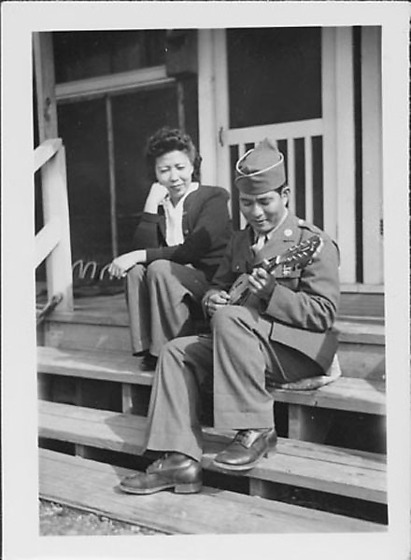 |
| Australische Soldaten im Zweiten Weltkrieg mit Ukulele |
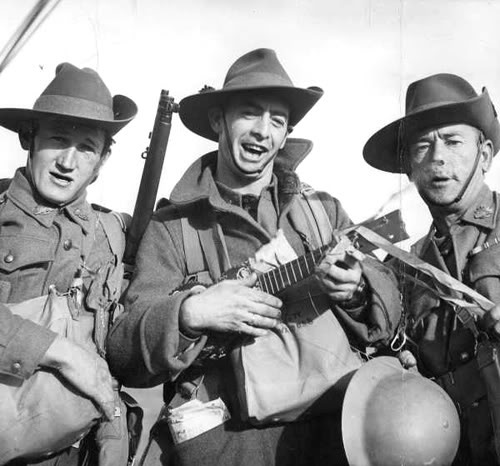 |
1946
Britain Delivers the Goods (Ad)
First Shipment of 'T.M.A' Instruments Arrived
"Ukulele Banjos" (Made in England)
Two models available from stock; others arriving soon.
„Melody Uke“. This model has been supplied to the „Services“ in many thousands during the war years. It is a beautiful model with 8-in. rim, as illustrated. Complete with case — $110.00
„Junior“. A popular model with 7-in. rim and resonator. Complete with case — $50.00
Wholesale Enquiries Invited.
T.M.A. Music House
The Straits Times  17.3.1946, S. 5
17.3.1946, S. 5
1948
Ergänzend dazu wäre noch zu sagen, daß die Instrumente, die heute gespielt werden, zum Singen nicht anregen, ja das Singen sogar verunmöglichen.
Gitarre, Laute und Ukulele sind nun die Instrumente für das Singen. Kommen nun diese Instrumente wieder in die Schul- und Wohnstuben, so wäre der Anreiz zum Singen wieder gegeben.
Fröhlin, Hugo: „Wie die Alten sungen, so …“. In: Schweizerische Lehrerinnenzeitung  53:21–22 (1948–1949), S. 332
53:21–22 (1948–1949), S. 332
1949
The Ukulele Menace
A cloud no bigger than a ukulele pick is hanging over the Sierras. According to a news dispatch, the ukulele is coming back. Like the foot-long snails recently discovered in gardens at San Pedro and threatening the nation, the ukulele revival has first appeared in California. May both the giant snails and the „uke“ be halted by pest controllers before they can spread beyond the mountains and crawl eastward.
There are those among us today who recall the third decade of the century in this country with nostalgia. But the high-stepping Twenties was also the decade of the ukulele, and few cases of nostalgia, no matter how acute, can include fond recollection of that four-string instrument of torture.
The ukulele was too easy to play. Four or five chords, readily mastered, was all that was required for a lad or lassie to become a ukulele virtuoso and bore family and friends to the point of complete distraction with renditions of popular songs and ballads. Historians may indeed someday attribute the growth in popularity roadhouses, country clubs and speakeasies during the middle Twenties to the frenzied searching for sanctuaries from people strumming ukuleles, and singing „That's Were My Money Goes“ — to which everyone knew at least 100 verses.
Barricades should be erected in echelon and in depth across his whole broad, fair land from the California-Nevada border to the Hudson to contain this menace. The ukulele, which apparently disappeared with hip flasks, coonskin coats, beaded evening gowns, the boyish bob and no bosoms, is threatening to return.
Toledo Blade  30.4.1949
30.4.1949
Ukulele Comeback
New York, May 21. — The National Association of Music Merchants (NAMM) reports the ukulele, standard equipment for college students in the 1920's, is staging a comeback. The NAMM says there's a shortage of 50,000 in music stores, and that 100,000 have been sold during the last six months.
Uke, Banjo Comeback
Probably the biggest surprise to string-instrument men was the comeback of the ukulele after an absence of more than 20 years. Jay Kraus, president of the Harmony Company, Chicago, estimated that nearly 150,000 ukes have been sold in 1949 and that more than 300,000 should go into consumers' hands this year. Most sales are in the $9 to $12 price class, and most of the buyers are non-professionals. Herb Koehlinger, sales manager of the Fred Gretsch Manufacturing Company, gave most of the credit for revival to Arthur Godfrey.
The ukulele is plunk in the middle of a comeback, said Uke Maker Jay Kraus last week. He expected about 300,000 to sell this year — nothing like the 1,000,000 sold to flappers and friends in 1925, but good as compared with the 40,000-to-60,000 average in the early '40s. One explanation for the demand: frog-voiced Arthur Godfrey's use of the uke on his television show.
N.N.: „Music: Warning to Raccoons.“ In: Time Magazine  8.8.1949
8.8.1949
Guitar and Uke Sheet Sought
New York, September 24. — A move is afoot to have music publishers include Ukulele and guitar chords on all popular sheet music. Walter Douglas, Music Publishers' Protective Association (MPPA) topper, sent out a letter to pubbers this week apprising them of the fact that uke and guitar sales are booming, as well as a demand for such music. Music stores, according to Douglas, cannot keep pace with the demand for the string instruments.
Years ago it was customary for all pop sheet music to carry the ukulele and guitar chords. Lately, some pubs have been printing the chords. It's expected that all pop publishers will do likewise.
1950
Stand by for the 'Plunks' Folk, Ukulele Makes Comeback in Iowa City
Remember back in the 20's when the really „hep“ college sheiks (early campus for wolf) would almost rather be caught without a coonskin coat than without a ukulele?
Well, it looks like history is repeating itself again.
On key, off key, whatever the key, the ukulele is making a national comeback. (I know, I own one!) (…)
The president of a New York ukulele company recently announced that since the „uke“ is making such a comeback his company is going to manufacture 300,000 of them this year compared to 40,000 before the war. (…)
The nice thing about the „uke,“ Mr. Cooley claims, „you can do it easy in 10 easy lessons — or less!“ (…)
The tuning is no problem either, according to this teacher. Just match up the strings with that old „my dog has fleas" refrain. (…)
Elfreda Kolsch in: Iowa Citizen-Press Citizen  4.2.1950, S. 10
4.2.1950, S. 10
Kaye Offers Uke Plan to MPPA; Pubbers Cool
New York, April 15. — In the interest of enlarging the dwindling market for sheet music, orkster Sammy Kaye28) appeared at a meeting of the Music Publishers' Protective Association (MPPA) this week to present a unique plan for pubber encouragement of the ukulele and ukulele music.
The plan — which MPPA execs did not warm to — is the creation of a non-profit co-operative publishing venture devoted to uke music and exploitation. Tunesmiths would be assigned to turn out uke type tunes and income would go toward uke music promotion. Tie-ups would be made with uke manufacturers, TV and raido [!] programs and record companies. Kaye promised to record the commissioned tunes if they were good and said that he was sure other artists and waxeries would go along.
As to the ultimate disposition of any copyrights resulting from the venture, the participating pubbers could draw for them at the conclusion – if any – of the venture.
Altruistic Motives
The orkster told The Billboard that his only interest was as a member of the music business and that he sought no profit for himself or his small publishing firm. With the lessening of home interest in the piano, he sees the uke as the best potential medium for sheet music. „It's an amateur's instrument, and when uke players want to run down a pop tune they have to buy sheet music — the more players, the bigger the sales.“ He is disapponted with the failure of the MPPA pubbers to respond to his suggestion, but would like to carry on his idea with any publishers who might be interested.
MPPA spokesmen explained that it is against the association by-plaws to form a corporation. They also pointed out that the organization had been encouraging all pubbers to include uke chords in copies for some time and to issue folios of music particularly suited to the instrument.
Here and There
The Ukulele Craze
If you hear the neighbor next door or Arthur Godfrey on the radio strumming a uke to the accompaniment of a song that you can murder better than they can, don't fall prey to the current craze for chord plunking and rush out to buy a ukelele. Don't let appearances and sounds deceive you: those apparently aimless nylon string pickers are MUSICIANS. Take my word for it.
And if some overzealous clerk in a music store tries to sell you a 25-cent book that will teach you how to play the ukelele in 5 minutes — one purchased from his store, of course — don't be a sucker. Kreisler, Paderewski, Nijinsky, Jelesnik, and Benny could master the uke in 5 minutes – but not me, and YOU.
To save you 25 cents for the instruction book and $ix bucks for the instrument I'm willing to describe for you my own painful experience trying to make music, ukelele style. It happened on my birthday. Junior or Janet, if you insist on being formal was „helping“ daddy open his presents. She must have been peeking during wrapping operations, because suddenly she gave a squeal and grabbed the bulkiest package of all. „Ohh, boobie!“ she gushed and holding it close, added defiantly, „Mines!“
If I had known what the package contained, I would have let the little claim-jumper have it. But lt was MY birthday, and the package looked like it might be a new badminton set, or some fishing equipment, so I pulled my rank and relieved her of her precious „boobie.“
You guessed it. What a boobie it was — a pea green ukelele, with genuine nylon strings!
„Don't cry, dumpling,“ I recovered quickly, „forgive me for taking YOUR present.“ But the ruse didn't work.
„Now I looked all over town for that, so sit right down and play it,“ commanded the voice of authority. „You may not know it, but ukeleles are hard to find. And I couldn't think of a nicer, different present.“ It was „different“ all right. I sat. I plunked. I pretended to tune the darn thing. I plunked some more.
„Give me mine boobie, right now!“ stormed Junior.
„You can't frustrate a kid her age,“ I ventured. „Besides, she's a pretty good music critic.“
„Oh, let me take it. Some people just simply don't appreciate thoughtful presents.“ And with that, the musician in our family sat down and strummed out a smooth accompaniment to „The Old Mill Stream“ and „Dark-town Strutters' Ball.“ The Oberlin Conservatory of Music, where my wife learned to play the piano, rose a notch in my estimation. The next night after supper the ukelele and a small booklet, „How to Play the Ukelele in 5 Minutes,“ occupied the spot customarily reserved for the evening paper. „Play boobie, right now!“ said the little dictator, evidently well rehearsed.
At first glance, the how-to-play-the-ukelele-in-five-minutes method appears ridiculously easy. Chords are numbered and little diagrams are provided, indicating the proper fingering. With the first three major chords, you can play dozens of pieces, theoretically, that is. And if you master ONLY nine chords, you're a ukelele Heifitz, the booklet suggested confidently. But there's one hitch nobody told me about. You start playing a tune that appears to have only the first three chords. Then, as your halting rendition approaches a questionable climax, a new chord, say 13 or 17, appears. When this happens, all you can do is leave the long-suffering singers, who are sweating it through with you, hanging on a note while you thumb through the booklet to find the lost chord. In spite of certain people's opinion, this process is rather painful on the graduate of the five-minute-lesson school of ukelele, not to mention the individuals unlucky enough to be singing along with him.
And then there's fingering and strumming!
If you're double jointed, you'll get along fine with a uke. With your left wrist twisted awkwardly around the neck of the uke, you strain and stretch your fingers to cover three or four strings at once, without touching any part of any other strings. It's tough just to accomplish these contortions, but you also must practice to change positions rapidly. At the same time, your right hand is trying to strum across all four strings at the same time, while your eyes are following the chord guides in the instruction book. Personally, I'll take vanilla — with all five fingers wrapped around one cone, and the other hand holding Junior away.
But a great talent is hard to conceal — especially with two relentless conspirators about the house. And no matter how carefully the darn thing may be hidden, it always appears mysteriously when guests arrive. And the new ukelele discovery has to drag out his instruction book and strum away, to the amusement — if not enjoyment — of the music-lovers assembled. And believe it or not, ukeleles are well-nigh indestructible. Junior has managed to demolish all of the glassware and most of the china in the house — not to mention a couple of mama's prized antiques — but what does she do to a fragile-looking ukelele? Nothing. That's the trouble with kids. You simply can't trust the little traitors.
But, lest your heart is rent with sympathy, here's one ukelele victim who has his revenge all figured out. Other people in our house have birthdays — even if they're not always remembered as they should be. And I've got some fine presents all figured out.
Junior, when she turns two in the near future, will be the proud recipient of a fine second-hand plastic mouth organ (presented to daddy on his previous birthday and never used). And mama, when she turns — on — (I can never remember ages and dates, fortunately), has a rare musical surprise in store. She gets a ZITHER, complete with a 25-cent instruction book!
Ray McGuire: „The Ukulele Craze“, in: The Deseret News  15.5.1950, S. 9
15.5.1950, S. 9
P.O.W. Whittling Starts WA Ukulele Industry
Boredom-killing whittling in Changi prisoner of war camp has started up an industry in Western Australia that might become a dollar-earner. Partner in JMG Industries at Jolimont Les O'Connell, filled in his spare time at Changi using a knife on coconut shells and pieces of tea chests to make a ukulele.
Heartened by his success he made a carved top ukulele which musicians in the camp hailed as a topline instrument. O'Connell decided to go into the business on his liberation.
This story was told today by his partner Jack Maskiell who was with O'Connell in Changi.
He said that it took six months to produce the first local ukulele.
From then on the ukuleles were marketed throughout Australia with great success.
„We got a bit cheeky,“ said Maskiell. „We sent them to Singapore and Ceylon and now dollar-earning samples are in the U.S.“
„We also have them in Britain.“
The firm has now produced 3000 ukuleles and 700 guitars. One of the craftsmen is former Subiaco footballer John Hetherington who works from a wheel-chair following a football accident.
Maskiell lost a leg in Changi. The men were given great assistance in their start by Perth builder R. J. Davies who made part of his yard buildings available and assisted them with machinery.
Dollars in Music
Pictured at work putting the finishing touches to a guitar are former Subiaco League footballer John Hetherington (left) and Changi Camp P.O.W. veteran Jack Maskiell. Maskiell is a partner and Hetherington a craftsman in turning out guitars, some of which it's hoped will be sold in dollar areas.
|The Daily News (Perth)  16.5.1950, S. 9
16.5.1950, S. 9
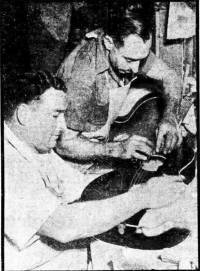 | 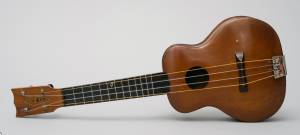 |
| JMG-Ukulele im Powerhouse Museum aus dem Besitz der Artistenfamilie Ardini |
Godfrey Bewails Lack of Uke Tuning Standard on Sheets
New York, July 1. — According to Arthur Godfrey, music publishers are fouling up a very good thing by failing to utilize a standard tuning system for ukuleles in marking uke chords on sheet music. Godfrey, whose TV and radio efforts have been a factor in bringing it back decries, more in sorrow than in anger, each pubber using a different tuning basis in printing uke chords.
In an exchange of letters with Syd Foley, of the Smith-Foley pubbery, the radioman advocates an A-E-C-G tuning system as being the easiest, most natural and most playable – but failing the A-E-C-G, he urges to get together and use one universal tuning system.
Godfrey Pens Note
„I have been teaching this method of tuning and playing on television … and I have been hoping that publishers would soon put the chords back into sheet music, but I am heartbroken to know that you are going back to the old confusing way of tuning the instrument,“ he wrote to Foley. In a second letter, after the pubber had informed him that the industry might resist a switch to a single tuning standard because of the [4] plates already set up and on hand, Godfrey followed up with: „I have no desire to foul up detail. I really don't care how the ukulele is tuned if you'll just standardize it. … The thing is all fouled up and unless the tuning is straightened out and standardized soon, the current uke fad will be just that – another fad – and soon will die. … I think you guys are silly fools if you don't jump immediately at this opportunity to put new life into the sale of sheeet music.“
Action at SPA
That the Godfrey pitch is not merely the crotchet of a uke-happy pixie was pointed up by a strong plea for exactly the same at Thursday's (29) industry meeting on the spurring of sheet music sales at Songwriters' Protective Association (SPA) headquarters. One of the pubber's field men present informed the group that at least a dozen publishers were using different tuning methods for their uke chords, and that the resulting confusion among ukulele neophytes could well blight the single most encouraging stimulus to sheet sales. The news came as a surprise to most of the gathering – case-hardened music business veterans all – and it was immediately agreed to bring the issue before the Music Publishers' Protective Association (MPA) with the request that the association give it serious study.
Attacks Fakes
Godfrey also castigated those uke manufacturers who have been flooding the market with cheap, unplayable instruments. „I think I have nipped this (obstacle) in the bud by going all out … against the cheap instruments. I have been cautioning my listeners against throwing away money on cheap, poorly made instruments nobody can play (and since a couple of the fakers have threatened suit which I would welcome, I think must have done some good.“
Foley, who had already set up copies for his current tune, Lil' Ol' You, by Jim Morehead, revised the uke instructions in accordance with the system Godfrey recommends, and on Foley's suggestion, the Irving Berlin pubbery has agreed to utilize the same arrangement for future uke chords. Whether other major pubbers will fall in line will probably depend on how the MPPA cottons to the proposal. [12]
1951
Waterproof ukulele
"Mail" New York Office
A new plastic ukulele is just the thing for deepsea divers wishing to serenade mermaids.
The makers claim absorption of moisture by the plastic and by the nylon strings, is nil.
They say a new ukulele craze comparable with that in the 'twenties, is sweeping America. Australian buyers have already ordered 20,000 of the new ukuleles.
The Mail (Adelaide)  5.5.1951, S. 23
5.5.1951, S. 23
1953
My Harassment of the Enemy With My Ukulele
Somewhere in my Korean travels I had acquired a ukulele. I thought learning to play it would pass the time and provide some entertainment. It took a while, but finally I learned to play one, and only one, tune. That was a fumbling, and not very well rendered, version of, My Bonnie Lies Over the Ocean.
One day, the Chinese tried to harass us with psychological warfare. They had a sound rig with a loudspeaker they used for „psywar“ blasting us with Chinese tunes … The Chinese knew it would get on our nerves.
At the height of the musical onslaught, Sergeant Henderson suggested we counterattack the Chinese psywar with my ukulele … our own version of Marine psywar. …
So, I broke out my uke, began to play, and the troops joined in. Our combined effort was worse than awful. It did, however, raise our spirits, and the Chinese capitulated. They turned off their propaganda harangue and their Chinese music after one last insult, „GI you no hocking good. You music terrible!“
Hilgartner, Peter; Ginder, Sam: Highpocket's War Stories and Other Tall Tales. Xlibris Corporation 2004 o.S.
1956
US-Soldaten im Einsatz in Korea
Jimmy had been married a few weeks prior to coming overseas, and his young wife, no doubt not realizing how closely we lived with one another, sent him a ukelele. Representing the unit, Mike Belovin wrote her in protest, claiming that listening to Jimmy on the ukelele was worse harassment than any the enemy had to offer.
Hess, Dean E: Battle Hymn. New York: McGraw-Hill  1956, S. 208–209
1956, S. 208–209
1958
Marilyn Strums Ukulele in 'Some Like It Hot'
This is Marilyon Monroe as she appears in her first Hollywood for two years: „Some like it hot.“ In it she plays Sugar Cane, a ukulele singer in an all-female band.
The Straits Times  19.10.1958, S. 14
19.10.1958, S. 14
1959
Für Liszt-Akademie Budapest und Operettentheater Phöngjang
Von Pauken und Trompeten und von geräuscharmen Instrumenten --- Klingender Petershof in Leipzig
„Marma“, das Warenzeichen von Karl Bauer, Markneukirchen. Die Inhaberin, Unionsfreundin Elisabeth Bauer, zeigte uns bereitwillig ihr Sortiment: Zupf- und Streichinstrumente aller Art, wie Gitarren für Konzert und Schlag- und Hawaigitarren, Banjos, Lauten, Mandolinen, Zithern, Balalaiken, Celli, Geigen und — Ukulelen. Sie wissen nicht, was Ukulelen sind? Wir wußten's nicht bis zu unserem Besuch: Die Ukulele ist dem Aussehen nach eine kleine Ausgabe der Gitarre mit vier Saiten und in anderer Stimmung; sie ist beheimatet in Südamerika. „Achtzig Prozent der Produktion gehen in den Export, in alle Länder, auch nach Uebersee. Die Kapazität wird voll ausgelastet. Bereits bis Montagabend hatten wir bedeutende Exportabschlüsse unter Dach und Fach. Unsere Messeneuheit: ein verbesserter Spielapparat für die Gitarre, „Guitarola“, für den, dem es zu lange dauert, das Gitarrespiel zu erlernen.“
1962
Japanese Sails Alone Across Pacific
Kenichi Horie, a 23-year-old Japanese, believes he was born to cross the Pacific. Not in a jet air liner … but alone in a small sailing boat … Early this year he started storing enough provisions and equipment to last his 5,300-mile voyage … He also took a sleeping-bag, a transistor radio, a ukulele, and a copy of Ernest Hemingway's „Old Man and the Sea“ translated into Japanese … When the wind turned favourably he sat back and strummed his ukulele.
1966
Hawaii, a Growing Market for Korean Goods
EXTENSION OF REMARKS of HON. SPARK M. MATSUNAGA of HAWAII IN THE HOUSE OF REPRESENTATIVES
Tuesday, January 25, 1966
Mr. MATSUNAGA. Mr. Speaker, we are all aware that the power and strength of the free world is dependent in large measure on the power and strength of each nation that comprises the community of free and independent powers.
We are therefore especially gratified to see an ally make rapid progress toward becoming a strong, economically independent nation. Such a country is our stanch ally, the Republic of Korea, which has been making deep inroads toward attaining economic self-sufficiency.
In a recent article written by Toni Withington of the Honolulu Star-Bulletin, South Korean Consul D. Y. Lee said that Korea has exported an estimated $170,000 worth of Korean goods to my own State of Hawaii in 1965, which is $50,000 more than the 1964 figure. The most recent item that has contributed toward the increased exports is the ukulele, originally a Portuguese musical instrument which is identified today with all Hawaiian music. Our state of Hawaii has been a growing market not only for the „Made In Korea“ stamped ukuleles, but also for imported Korean foods.
We are indeed happy to be able to help Korea improve her economic position. I should like to submit for inclusion in the Congressional Record the article written by Tom Withington, which appeared in the Wednesday, January 12, 1966, issue of the Honolulu Star-Bulletin:
[From the Honolulu (Hawaii) Star-Bulletin Jan. 12, 1966]
The Korean Ukulele: At $2.99, a Good Start
(By Toni Withington)
The plinkety-plunk of the ukulele is musically signaling another nation added to its cosmopolitan history.
The Portuguese instrument that an became internationally known symbol of Hawaii and an economic boon for Japan is now being stamped „Made in Korea.“
The initial success of the low-cost Korean ukulele is only in Hawaii, but it may be a happy Indication of a new economic blossoming in the Republic of South Korea.
At $2.90, the darkwood ukulele competes favorably with higher priced Japanese and American ukuleles that it copies.
Entered market last tear
„We started buying the Korean ukuleles when they entered the market last year after an 8- or 9-month scaracity of inexpensive ukuleles.“ said R. D. Smith of Longs Drug Stores, which sells them locally. „The New York World's Fair bought out thousands of the ukuleles from Japan and we were really hard pressed to find them,“ he said.
Long, at Ala Moana Shopping Center, has sold more than 600 of the Korean Instruments. Other branches also sell them.
The Japanese ukuleles have reentered the Hawaiian market, but have found they must share it with Korean ukuleles and guitars.
„Korea is making many things Japan makes, with the same price and the same or higher quality,“ said Charles Lee, vice president of KBS Trading Co., Hawaii's largest importer of Korean merchandise.
Bought in Korea for $1.45 each
Lee's company buys the ukuleles from the Korean manufacturer for $1.45. It ships the instruments here, paying a 34-percent duty on the way.
„Last year was gret. Our merchandise was really going strong,“ Lee said. Korean Consul D. Y. Lee estimated that Korea exported more than $170.000 worth of goods, most of it Korean foods, to Hawaii last year. This was a jump of more than $50,000 of that increase was consumer goods.
Such an influx of Korean items may be only a small indication of the goods, specially electronic goods, that will soon rival Japans on the world market, according to the report in the newspapers.
Two new Korean factories
The report heralded the near completion of two new Korean factories which will produce household electronic equipment.
The Korean ukuleles, like most of the Korean merchandise, are competing with Japanese goods on a market once belonging chiefly to Japanese firms.
„The Korean ukes have driven down the price of the Japanese ones,“ Smith said. „For their money they are very good. They do have a slight problem with the peg screw. We had 15 complaints from the 600 we sold.“
„Of course, the $16 Kamaka ukulele definitely sounds better, but the customer must ask himself whether it sound $13 better.“
Samuel K. Kamaka of Kamaka & Sons, Honolulu ukulele makers, agree that the cheaper ukuleles are „passable,“ but the tone is „an entirely different type of sound.“
„The $3 and $4 ones are more like toys. We could never compete with them pricewise,“ he said.
Some are good, some are bad
Some of the (Korean) ukes are very good and some are very bad, said Alfred Hamed, a ukulele teacher at Harrys Music Store in Kaimuki.
„They seem to be able to copy the design of the good American ukes, but the quality is not always there,“ he said.
„But some of the cheaper ukuleles compare favorably to the Kamaka ukulele,“ Hamed added.
Other Korean goods compare favorably, too. According to the Korean consulate, last year Hawaii imported items from pianos to sewing machines, from bright silk shirts to plastic raincoats. Korean handicrafts have met a ripe market, he said.
Isle ukuleles sold in Japan
But because Korean and Japanese ukuleles are selling so well here, Sam Kamaka has decided to sell his ukuleles in Japan.
He recently completed arrangements to manufacture one model of the Kamaka koa wood ukulele in Japan to sell to the Japanese.
Congressional Record Bd. 112 Appendix, 1966, S. A321
1969
Ukulele
A Hawaiian instrument of the guitar family, with four strings and a long fingerboard, usually fretted. It probably developed from a Portuguese guitar called machete [see Guitar family] and became popular in the United States c. 1920. The notation for this instrument follows the principles used in the lute tablatures of the 16th century but was invented independently [see Tablatur VI]. See ill.29) under Guitar family.
Willi Apel: Harvard Dictionary of Music  . Harvard 1969 (2. ed.), S. 881
. Harvard 1969 (2. ed.), S. 881
1976
Outdated Laws
Washington (UPI). — It's illegal to carry an unwrapped ukulele on the streets of Salt Lake City.
The Dispatch  30.4.1976, S. 3
Diese Meldung der Nachrichtenagentur UPI wird bis heute immer wieder verbreitet. Sie geht auf den Artikel von Ron Berler: „A History of Laughable Laws“ in der Juristenzeitschrift Student Lawyer vom April 1976 zurück, wie ein Beitrag des UPI-Redakteur Dick West verdeutlicht:
30.4.1976, S. 3
Diese Meldung der Nachrichtenagentur UPI wird bis heute immer wieder verbreitet. Sie geht auf den Artikel von Ron Berler: „A History of Laughable Laws“ in der Juristenzeitschrift Student Lawyer vom April 1976 zurück, wie ein Beitrag des UPI-Redakteur Dick West verdeutlicht:
Forgotten Laws
Student Lawyer, a publication circulated among, ah, student lawyers, recently had an article on outdated, presumably forgotten laws that are still on the books in some states and cities.
The list included statutes making it illegal to carry an unwrapped ukulele …
As for the Salt Lake City ban on unwrapped ukuleles, bear in mind that back in the age of innocence the hourglass figure was considered the ultimate in feminine sexiness.
Also bear in mind that the ukulele is shaped like an hourglass. And further consider that it originated in Hawaii, where it was strummed by hip-swaying maidens clad in grass-skirts.
In these circumstances, there was valid fear on the mainland that the sight of an unwrapped ukulele might inflame the passions of wholesome young men and start them on the path to degradation.
Student Lawyer apparently thinks it's regrettable the law has never been repealed. I say it's regrettable it is no longer enforced.
The Palm Beach Post  6.5.1976, S. B16
6.5.1976, S. B16
The First Roadshow of the Church
In den Stadtgesetzen von Salt Lake City findet sich heute allerdings keine Spur dieses angeblich vergessenen Gesetzes. Es scheint sich um eine „urban legend“ zu handeln, die sich an längst vergessenen Vorschriften der sittenstrengen Mormonen belustigt. Andererseits besitzen auch die Mormonen eine Legende, die mit der Ukulele in Salt Lake City zu tun hat. Sie rankt sich um ihren 8. Präsidenten, George Albert Smith (1870–1951). Dieser soll als Grundschüler in eine Klassenkameradin verliebt gewesen sein. Um ihr Herz zu gewinnen, lernte er Banjo und Ukulele spielen und gab jede Woche eine öffentliche Vorführung.
He was wearing a top hat and a plaid coat and started playing the banjo and the ukulele and singing songs he had written about how funny he was looking … The people loved it! … Authorities asked him to take his show on the road all over Utah, and it became the first roadshow of the Church.
Conrad, Chad P.: Daily Discipleship: Becoming An Everyday Latter-day Saint. Cedar Fort 2013, o.S.
Das offensichtliche Problem dieser Legende ist: Die Ukulele wurde erst 1879 erfunden, als Smith bereits 9 Jahre alt war. Vor 1890 war sie in den USA nicht präsent. Geheiratet hat Smith seine Angebetete allerdings bereits 1892. Ganz sicher also ohne Ukulele. In der offiziellen Lebensbeschreibung von Smith steht deshalb auch „Gitarre“.
 Lympne nach Australien ab. In Kalkutta stieg sie jedoch auf einen Dampfer um; Richards flog die Maschine, eine De Havilland Gipsy Moth, allein weiter nach Australien, wo Chaytor wieder zu ihm stieß. Am 4.5. trafen sie in Sydney ein. Vgl: John William: „Introducing Lady Chaytor“. In: Sunday Mail (Brisbane)
Lympne nach Australien ab. In Kalkutta stieg sie jedoch auf einen Dampfer um; Richards flog die Maschine, eine De Havilland Gipsy Moth, allein weiter nach Australien, wo Chaytor wieder zu ihm stieß. Am 4.5. trafen sie in Sydney ein. Vgl: John William: „Introducing Lady Chaytor“. In: Sunday Mail (Brisbane)  15.5.1932, S. 21.
15.5.1932, S. 21.


